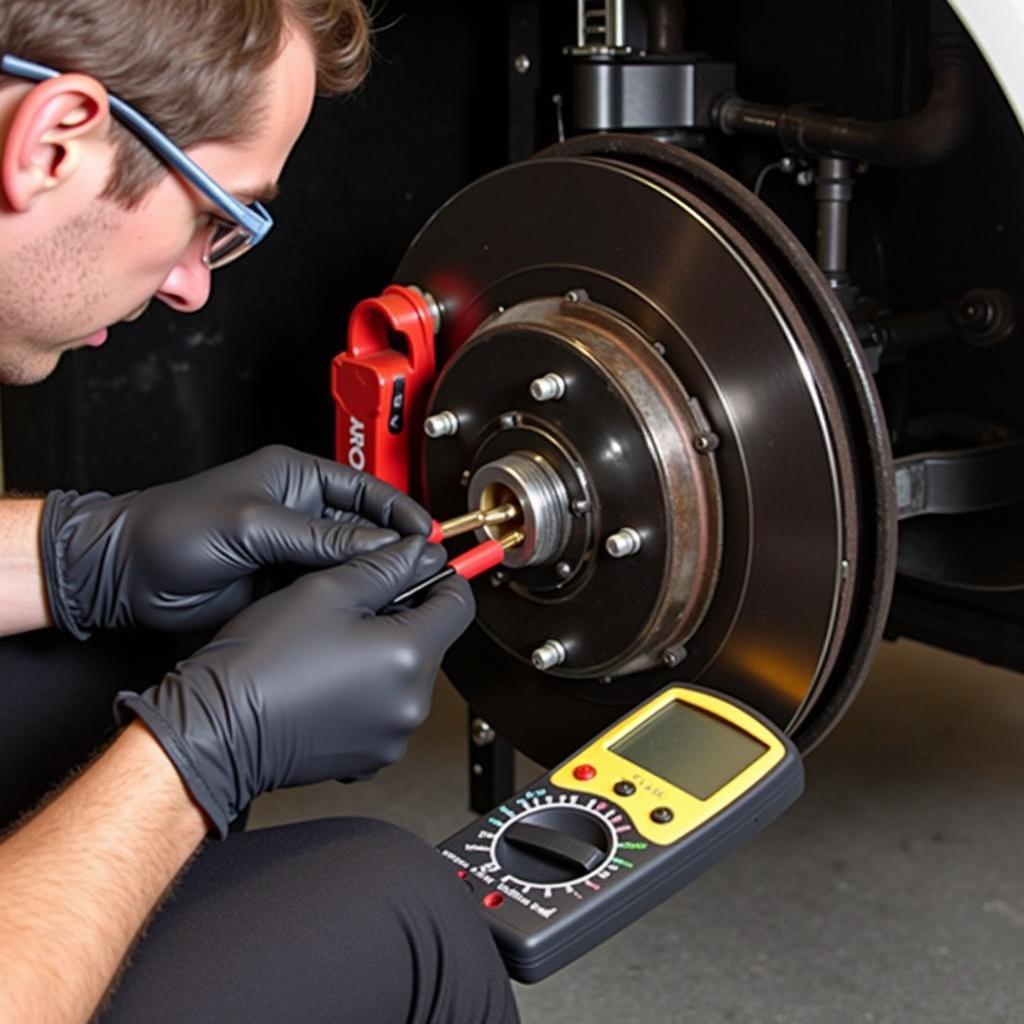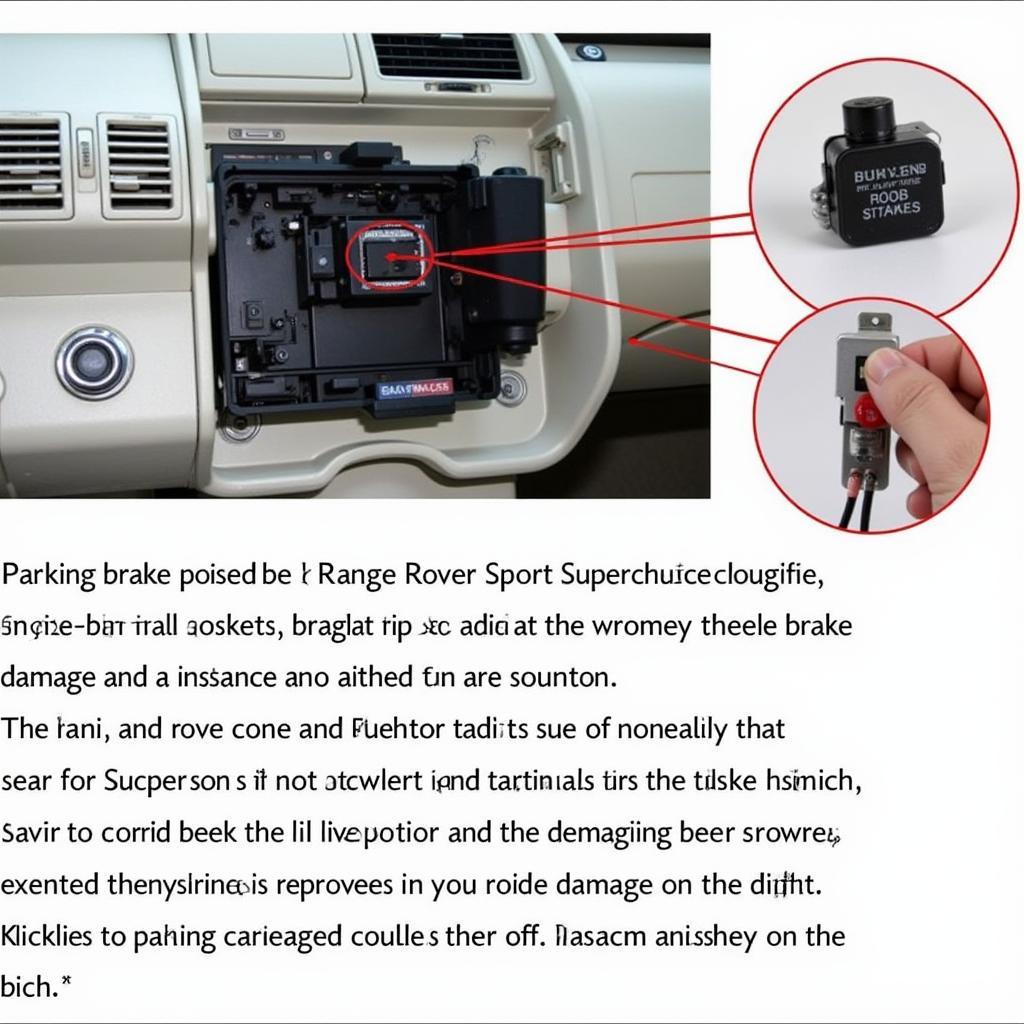The brake warning light on your 2011 Chevy HHR is a crucial safety feature designed to alert you of potential braking system issues. When this light illuminates on your dashboard, it’s essential not to ignore it. This article delves into the common causes behind a 2011 Chevy HHR brake warning light and provides insights into potential solutions.
Understanding Your Chevy HHR Brake System
Before we dive into the causes, it’s helpful to understand the basics of your HHR’s braking system. This system is primarily composed of:
- Hydraulic System: This network uses brake fluid to transmit force from the brake pedal to the wheels, enabling your vehicle to stop.
- Brake Pads and Rotors: When you apply the brakes, these components create friction, slowing down the wheel rotation.
- Brake Lines and Hoses: These carry the brake fluid throughout the system.
- Sensors: Various sensors monitor different aspects of the system, including brake fluid level and brake pad wear.
Common Causes of a 2011 Chevy HHR Brake Warning Light
Here are the most frequent culprits behind a glowing brake warning light:
1. Low Brake Fluid Level
This is often the most straightforward cause. If the brake fluid level in the reservoir drops below a certain point, the warning light triggers.
Possible Reasons for Low Brake Fluid:
- Leak in the System: Brake fluid leaks can occur in the lines, hoses, or even at the calipers.
- Worn Brake Pads: As brake pads wear down, the calipers need to extend further to engage the rotors. This requires more brake fluid, potentially leading to a low level.
2. Worn Brake Pads
Brake pads have wear indicators that make a high-pitched squealing sound when they wear thin. If you ignore this sound and continue driving, the brake warning light might activate.
3. Faulty Brake Light Switch
The brake light switch is located above the brake pedal. It signals the brake lights to illuminate when you press the pedal. A malfunctioning switch can sometimes trigger the brake warning light.
4. ABS Issue
The Anti-lock Braking System (ABS) prevents wheel lockup during hard braking. If your HHR’s ABS system experiences a malfunction, it can illuminate the brake warning light.
Troubleshooting the Brake Warning Light
Here’s a step-by-step approach to help you identify the issue:
- Check Your Owner’s Manual: Always start by consulting your owner’s manual for model-specific information and safety precautions.
- Inspect Brake Fluid Level: Park your HHR on a level surface and locate the brake fluid reservoir (usually a translucent plastic container). Check the fluid level against the minimum and maximum markings.
- Look for Leaks: Visually inspect the brake lines and hoses running along the undercarriage of your vehicle for any signs of fluid leaks.
- Listen for Unusual Noises: Pay attention to any unusual noises like squealing or grinding when you apply the brakes. This can indicate worn brake pads.
- Consider Your Driving: Have you noticed any changes in how your brakes feel? Does the brake pedal feel spongy or go closer to the floor than usual?
Important: If you suspect a brake fluid leak or a serious issue, it’s crucial to stop driving your HHR immediately and have it towed to a qualified mechanic.
When to Consult a Professional
While some brake warning light causes might be simple to diagnose and address, others require professional expertise. If you encounter any of the following, seek help from a certified mechanic:
- You are uncomfortable working with car components.
- You suspect a brake fluid leak or cannot find the source.
- Your brake warning light remains illuminated even after adding brake fluid.
- You notice unusual sounds or sensations when braking, like grinding or pulling to one side.
- Your ABS light is also illuminated alongside the brake warning light.
Tips for Maintaining Your HHR’s Brakes
Preventative maintenance is key to a safe and reliable braking system:
-
Regular Inspections: Have your brakes inspected at least once a year or every 12,000 miles, or as recommended in your owner’s manual.
-
Brake Fluid Flush: Most manufacturers recommend flushing your brake fluid every 24,000 miles or every two years to prevent corrosion and maintain optimal performance.
-
Quality Parts: When replacing brake components, opt for high-quality parts from reputable brands.
-
Driving Habits: Avoid riding the brakes, as this can lead to premature wear.
“Regular maintenance, including timely brake fluid flushes and inspections, is crucial. Think of it like changing the oil in your car – it prevents bigger problems down the road.” – John Miller, ASE Certified Master Technician
Conclusion
A glowing brake warning light on your 2011 Chevy HHR should never be ignored. Understanding the potential causes and adopting a proactive approach to maintenance will help ensure your safety on the road. While some issues might be simple fixes, don’t hesitate to consult a qualified mechanic if you encounter complex problems or are unsure about any aspect of your brake system.


